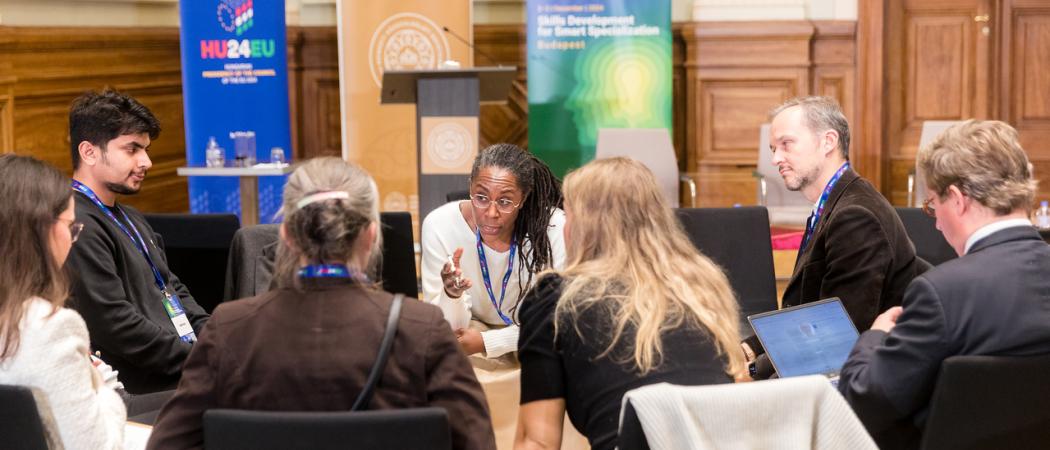An insufficiently qualified workforce has hampered the progress of smart specialisation strategies

For an example for the competitiveness challenges facing the EU, look no further than outer space.
Europe’s space industry is confronted with significant hurdles: an increasingly competitive global market, an ageing workforce, and a skills deficit among younger workers. The industry also lacks gender diversity: According to European Commission officials, men account for around three-quarters of the sector’s workforce.
The role that education and training play in empowering digital innovation and the EU’s future competitiveness was the subject of the Skills Development for Smart Specialisation Conference, held on 2-3 December in Budapest under the Hungarian presidency of the EU. Although the discussions were cross-cutting, a panel dedicated to the space sector highlighted the broader challenges facing Europe, as well as the opportunities that exist through smart growth initiatives and collaboration. The event was organised by the Hungarian National Research Development and Innovation Office (NRDIO) and funded by the European Commission.
More than a decade has passed since the Commission urged member states to develop so-called smart specialisation strategies (S3) to boost growth and innovation. In some cases, these strategies have fallen short of expectations, hobbled by a lack of ambition and a disconnect between development goals and the availability of skilled workforces to achieve them.
“If you do not have the time or money to execute what you say you are going to execute, then it is going to fail,” Coen De Graaf, senior consultant for IDEA Consult, a policy support group in Brussels, said in highlighting issues that arose during panel debates. “You have to support it [S3] with the right instruments and the right measures,” he added, pointing out that skills development and inter-regional cooperation are crucial to strategic success.

Skills are high on the policy agenda
The conference’s discussions on ways to bridge the gaps between S3 and available skills were timely, coming a day after the new European Commission took office with returning Commission President Ursula von de Leyen vowing to “put research and innovation, science and technology at the heart of our economy.” At the start of her second term, she appointed the first-ever Commissioner for Start-Ups, Research and Innovation, Ekaterina Zaharieva, and tasked an executive vice president, Roxana Mînzatu, with spearheading the commission’s work on skills and preparedness.
The skills conference also reflected key priorities of Hungary’s current EU presidency. It calls for closer cooperating between educators, training institutions and businesses to create new job opportunities and supercharge economic competitiveness.
At the conference, many panellists stressed the need to better link S3 initiatives and training to address skilled labour shortages — particularly in healthcare, digital services and engineering. They also noted that there is too little progress on retraining and up-skilling older workers. According to the Commission, fewer than 40% of adults participate in training, compared to the 60% marker set out in the European Pilar of Social Rights action plan.
Tuan Trinh, regional director East at EIT Digital, a multi-stakeholder platform for digital technologies, noted one of the key ingredients for successful start-ups is the team, which includes having qualified workers. He pointed out that “there is no innovation without education.”
Building larger networks
Trinh also highlighted the value of regional cooperation. EIT Digital participates in two projects under the Commission’s Regional Innovation Valleys initiative, which aims to promote regional coordination and pioneering research in areas, such as digital healthcare and the circular economy. This kind of cooperation “is very important for Europe — the inter-region approach, working together for a common purpose and for a common aim,” Trinh noted in an interview after a panel discussion.
Angelina Bekasova, senior expert for Space and Innovation Policy at Latvia’s Ministry of Economics, refers to S3 as “our bible of innovation” which helps guide policy decisions and promotes synergies between government officials, the private sector and academia. S3 was developed in Latvia as a broader platform for defining research, development and innovation needs, foreign direct investment projects, regulatory frameworks and international cooperation supporting Latvia’s thriving start-up culture.
“It's always an extra value when you cooperate internationally — people are just curious. Also here, RIS3 [research and innovation strategies for smart specialisation] gives you a clear structure where to look for people and opportunities that suit your niche the best,” Bekasova commented on the sidelines of the conference. “International cooperation facilitates access to broader networks and offers an opportunity to assess your standing. It can serve as a source of motivation or a chance to refine and enhance your activities.”
Rethinking vocational training
Coordination between the education and private sectors is also crucial. In Hungary, the vocational system and employers are working in tandem to ensure that training is more in sync with market needs, creating a win-win situation for students and the private sector. Gergely Pálmai, head of department of Hungary's Ministry of Culture and Innovation, said vocational education and training (VET) reforms in recent years have started to pay off, with students more motivated to learn and employees getting access to well-trained workers. Hungary is one of Europe’s top performers when it comes to employment levels for VET graduates: nearly 52% are employed, 27% are studying and working, and 16% are studying, Pálmai told the conference.
Indeed, Hungary is using its EU presidency as a platform to highlight the importance of greater competitiveness in research and innovation “One of the main points I have taken from this conference is that you cannot start too early with skills development, and you cannot start too late,” Borbála Schenk, NRDIO’s head of the international affairs department, said in her concluding remarks at the conference.




 A unique international forum for public research organisations and companies to connect their external engagement with strategic interests around their R&D system.
A unique international forum for public research organisations and companies to connect their external engagement with strategic interests around their R&D system.